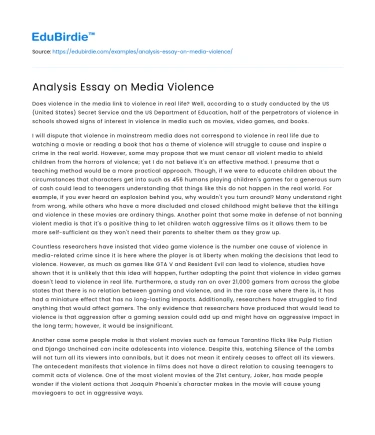Does violence in the media link to violence in real life? Well, according to a study conducted by the US (United States) Secret Service and the US Department of Education, half of the perpetrators of violence in schools showed signs of interest in violence in media such as movies, video games, and books.
I will dispute that violence in mainstream media does not correspond to violence in real life due to watching a movie or reading a book that has a theme of violence will struggle to cause and inspire a crime in the real world. However, some may propose that we must censor all violent media to shield children from the horrors of violence; yet I do not believe it's an effective method. I presume that a teaching method would be a more practical approach. Though, if we were to educate children about the circumstances that characters get into such as 456 humans playing children's games for a generous sum of cash could lead to teenagers understanding that things like this do not happen in the real world. For example, if you ever heard an explosion behind you, why wouldn't you turn around? Many understand right from wrong, while others who have a more discluded and closed childhood might believe that the killings and violence in these movies are ordinary things. Another point that some make in defense of not banning violent media is that it's a positive thing to let children watch aggressive films as it allows them to be more self-sufficient as they won't need their parents to shelter them as they grow up.
Save your time!
We can take care of your essay
- Proper editing and formatting
- Free revision, title page, and bibliography
- Flexible prices and money-back guarantee
Countless researchers have insisted that video game violence is the number one cause of violence in media-related crime since it is here where the player is at liberty when making the decisions that lead to violence. However, as much as games like GTA V and Resident Evil can lead to violence, studies have shown that it is unlikely that this idea will happen, further adapting the point that violence in video games doesn't lead to violence in real life. Furthermore, a study ran on over 21,000 gamers from across the globe states that there is no relation between gaming and violence, and in the rare case where there is, it has had a miniature effect that has no long-lasting impacts. Additionally, researchers have struggled to find anything that would affect gamers. The only evidence that researchers have produced that would lead to violence is that aggression after a gaming session could add up and might have an aggressive impact in the long term; however, it would be insignificant.
Another case some people make is that violent movies such as famous Tarantino flicks like Pulp Fiction and Django Unchained can incite adolescents into violence. Despite this, watching Silence of the Lambs will not turn all its viewers into cannibals, but it does not mean it entirely ceases to affect all its viewers. The antecedent manifests that violence in films does not have a direct relation to causing teenagers to commit acts of violence. One of the most violent movies of the 21st century, Joker, has made people wonder if the violent actions that Joaquin Phoenix's character makes in the movie will cause young moviegoers to act in aggressive ways. The actor himself gets questioned whether or not the film would inspire 'an unstable, self-pitying loner with a mass-shooter mindset,' The actor responded by saying that 'anyone can have that level of emotional disturbance, they can find fuel anywhere. I don't think that you can function that way.' I believe that there is the possibility that watching a violent film, such as Joker, can erupt in pent-up aggression in any person, further backing up the point of the titular actor. Phoenix's statement also supplies insight that violence can be 'fuelled' from anywhere, especially in films however, I believe that this would be unlikely, and this is then further backed up by a study from Stetson University led by Professor of Psychology, Christopher Ferguson, who says that 'It doesn't appear that PG-13-rated movies are having any impact on viewers'.
One of the most controversial directors of modern cinema, Quentin Tarantino, stated that he believes his five-year-old son, Leo, should be allowed to watch the violent and bloody movie Kill Bill, which Tarantino directed himself. He thinks this because he wants his child to have rich cinematic knowledge, including watching violent and aggressive films. By doing this, he wants to replicate his childhood of cinema by viewing these gruesome films. I believe that children at the age of 5 should be prohibited from such gruesome scenes of violence at such a young age, no matter what cinematic benefits it may bring. However, if parents were to educate them about the unrealisticness of these 'fantasy' films, it would mature kids, making the experience more acceptable.
Does violence in the media link to violence in real life? In my opinion, no. If you take the quotation from Joaquin Phoenix, there is a chance that it can arise suppressed violence but, the science and figures show that there is little chance that it will release repressed emotions. However, many believe that we should censor children from violent media as a precaution. Despite this, letting children watch these violent films could educate them on the horrors of the world and help reinstate right from wrong. After reviewing all arguments and data, no matter what perspective you look at it from, there is no proper evidence that supports the view that violence in mainstream media causes violence in young people.






 Stuck on your essay?
Stuck on your essay?

